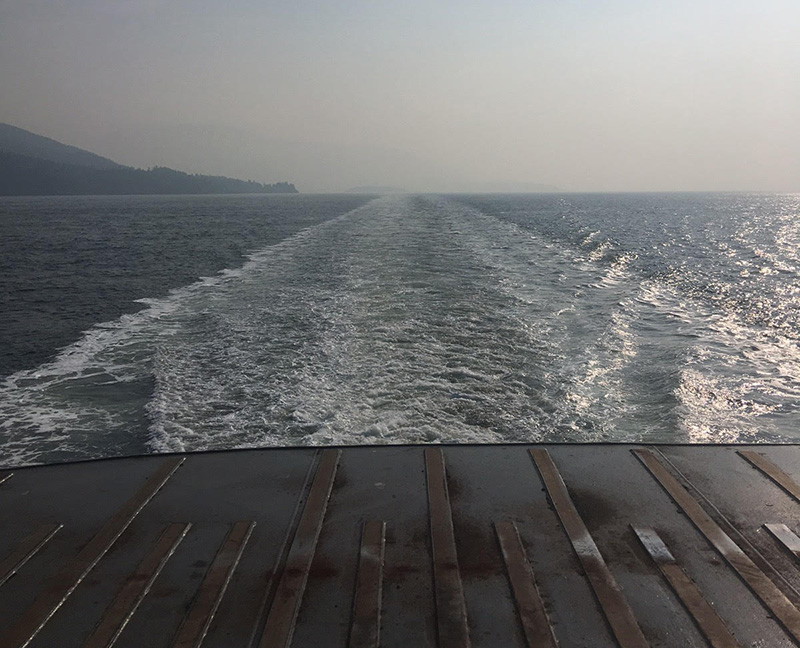“Am I Too Embarrassed to Save My Life?” I think of this headline often, and of Jane Eaton Hamilton’s affecting essay for the New York Times in which Hamilton questions how bold they must be, daily, to save their own life. Because of their heart condition, they must restrict seemingly anodyne activities (that is, for the rest of us perhaps) such as walking to a restaurant or up flights of stairs.
How many times in a day, week, year must they convince people of their limits, and how many times do they end up pushing past them due to pressure or discomfort? Hamilton wonders: will it be embarrassment in the end that kills me?
In Hamilton’s case, it’s their heart. In my spouse Ellen’s case, it’s her lungs. Ellen’s condition has almost killed her several times. Dramatically, in Oxford when her lungs failed; in Texas when her small feet ballooned into a man’s size 13 in days. Strange things happen to sick bodies. There were other times. Now, in addition to her precarious health, there is the threat of COVID-19 literally in the air.
I think of embarrassment often nowadays, because of our caution. We’ve changed our lives dramatically since March. A member of Ellen’s health-care team reminded her, “Public health is not individual health. You can’t follow general guidelines. You need to be more careful.”
And so it was a big deal for us to finally agree to visit our family on Vancouver Island in October. We planned every aspect of the trip carefully. We’d drive over, we’d remain in our car on the ferry, we’d pack our own food, and so on.
Our plan was upended. We boarded the ferry and learned with a shock that the rule that had been relaxed to permit people to remain in their cars on BC Ferries was back in place.
In spring, Transport Canada had rightly lifted its requirement that passengers leave lower decks in a measure to support physical distancing and prevent transmission of COVID-19. But, as we learned, it was reinstated on Sept. 30.
This forces all passengers to gather — except for those on the open upper car deck who may remain in their vehicles — on a common deck after nearly 10 months of public health messaging urging us to refrain from large gatherings and to keep apart.
Why, and why now? The reasoning has been communicated unevenly but has largely been relayed as a safety measure, in accordance with international marine law, in case of fire or issues with dangerous cargo, despite the competing safety concerns of the pandemic.
Premier John Horgan spoke out against the policy resurrection, vowing to keep pushing against what he called its “heavy handed” and “unwelcome intrusion” during COVID-19, but the policy remains in effect.
Worryingly, as of Nov. 7, RCMP travel on BC Ferries as its enforcers.
One frightful ferry
The Queen of Cowichan’s welcome message crackled over the loudspeakers. To our ears, the loudspeaker may as well have transmitted, “Now you must play Russian Roulette.”
We watch with alarm as people crowd towards the elevator, like they used to before COVID-19 times. We debate staying in our car anyway, but soon give in. We decide to take the stairs despite my partner’s broken-down knees, and despite what we had recently read about respiratory droplets remaining suspended in the air for 30 minutes.
The stairwell is a narrow, enclosed space. As we ascend, a man comes up behind us quickly. He’s not wearing a mask. Soon he’s inches, rather than feet, from me. “You’re not wearing a mask,” I declare/accuse him, and he responds by raising his hand and waggling the disposable mask in his grasp. He brushes past. By the time Ellen and I reach the main deck, we are rattled.
Melodramatic, right? Overreacting? Weak? Again, I think of Hamilton’s essay. Is it going to be following the rules that makes me a widow?
The deck is open and airy with plenty of spaces thoughtfully cordoned off to promote social distancing. Just kidding. There’s none of that.
We funnel through the carnival that is the passenger deck. The cafeteria lineup snakes around the deck from both entrances. We scrape against dozens of shoulders and backs along the tight passageway. There are so many naked faces in the cafeteria, eating, laughing, inhaling, exhaling. Several unmasked faces in the main seating areas for reasons I can’t guess. Many others who haven’t managed to cover their mask over their mouth and nose at the same time. We find no spot to settle that’s six feet or even a few feet from groups of people.
Embarrassed, we speak to each other in low tones. There is a close liveliness on this vessel that screams danger.
We elect to retreat to our car.
We are quite unprepared for what follows.
Let them wait
After our trip, I share our story with Ladysmith resident Troy Grant. Grant lives with a disability that affects his mobility. He is unable to sit or stand for more than a few minutes at a time.
In late 2016, when the Transport Canada policy was about to come into effect, he contacted BC Ferries with a request to accommodate his disability by permitting him assured access to the upper deck where he’d be able to recline in his vehicle during sailing. At first his request went ignored. When he finally managed to escalate his case, they refused to accommodate him.
He was told by BC Ferries that he would be treated like any other customer. He was advised to pay for a reservation, arrive 90 minutes early, and bring a doctor’s note. He could request the upper deck and they would “try” to accommodate him without guarantee. If it didn’t work out, said customer relations in an email, “you will have the option to wait and travel on the next sailing.”
While “let them wait” may defy laws that require people with disabilities to be reasonably accommodated by service providers and employers, BC Ferries was unmoveable. (They offered Ellen and me the same advice over two phone calls since our trip.)
Grant speaks with calm reflection and wonder: “I can’t really ambulate. Especially on the ferries. It’s impossible to get through cars and get onto the elevator. But there’s basically no accommodation for that. They were basically saying: ‘You just have to figure it out.’”
In 2019, Grant filed a human rights complaint, not just for himself but for “all the passengers who are like me but who are too timid or afraid to be able to fight for themselves.”
BC Ferries eventually offered Grant a letter exempting him from having to leave his car on the lower deck (a letter Grant insists he never received). But the offer stung.
“I felt like I was a steerage passenger, like I wasn’t worthy to be on the safe deck. My point was — their whole reason they cited was, you could die down there. Fires, any number of things.”
BC Ferries fought back on the complaint with, as Grant says, “a whole team of lawyers. Hearing after hearing. Me against one of the biggest law firms in the country.”
Those lawyers argued “the primary concern was that, in the event of a safety incident, BC Ferries did not know how many passengers remained on the lower deck.” In this case, they would know of Grant’s location in the event of an emergency.
Grant eventually reached a settlement with BC Ferries outside of the tribunal.
And of course for a while this spring, BC Ferries found it possible to solve its “primary concern” and track who stayed in their cars on lower decks. Until it again snatched away that option.
Which poses questions: If such accommodation is possible and, in fact, safe, why did Grant have to press so strongly to receive it? Where is this accommodation for the class of passengers with disabilities with similar needs? Why can’t BC Ferries implement new practices to ease the burden of those it places most as risk?
“I’m still in really bad shape medically,” Grant says 2.5 years after filing his complaint. “They really fought it. I wish I could tell you why they fought it so hard.”
‘It’s not safe for her’
As for Ellen and me, we’ve only been back in our car for a few minutes when a deckhand knocks at our window, telling us to leave. We try to explain, but he walks on, saying something like “This is what I’m supposed to tell people.”
Minutes later, two more workers approach. One carries a large stop sign with messaging that I can’t recall but likely reads something like “You shall not stay.” She bounces the sign at our eyelines. We try to explain. “I’m sorry —” Ellen begins. They shake their heads at us, they cross their arms in an X. The sign continues to bounce. It reminds me of strange children’s television.
“I’m sorry. Immunocompromised. It’s not safe for her,” I say. We all shake our heads at each other.
Again, an hour into the voyage, three more people arrive. One of them is a security officer. A worker shouts at us and flips her hand when I try, again, to explain.
“What if there are too many people on the passenger deck? What if we can’t distance up there?” She inhales and repeats, these are the rules.
“Well, how can we make sure we’re on the right deck next time?”
“There are no guarantees,” she answers firmly. She repeats the messaging offered to Grant: you can wait as many sailings as it takes, if you need to remain in your vehicle.
Security writes us up. He explains that we could be fined up to $12,000 by Transport Canada. But only if BC Ferries decides to pass our information along to them. Kindly, he tells us he’ll note our reasons for returning to our car. “It’s crazy up there,” he adds.
That same day, a group of anti-mask protesters cause a disturbance on the same route, prompting BC Ferries to call in West Vancouver RCMP. Their punishment? A one-day travel ban. Were they embarrassed at the scene they caused? I doubt it.
“I don’t blame you.” At least Grant and my partner and I have these words to hold onto, spoken by a BC Ferries customer representative after our harrowing trip.
But what I want to know is: is the $12,000 fine in the mail — and is $12,000 the new toll for disabled passengers who refuse to push past their safe limits, or might they pay the ultimate price? ![]()
Read more: Health, Rights + Justice
















Tyee Commenting Guidelines
Comments that violate guidelines risk being deleted, and violations may result in a temporary or permanent user ban. Maintain the spirit of good conversation to stay in the discussion.
*Please note The Tyee is not a forum for spreading misinformation about COVID-19, denying its existence or minimizing its risk to public health.
Do:
Do not: